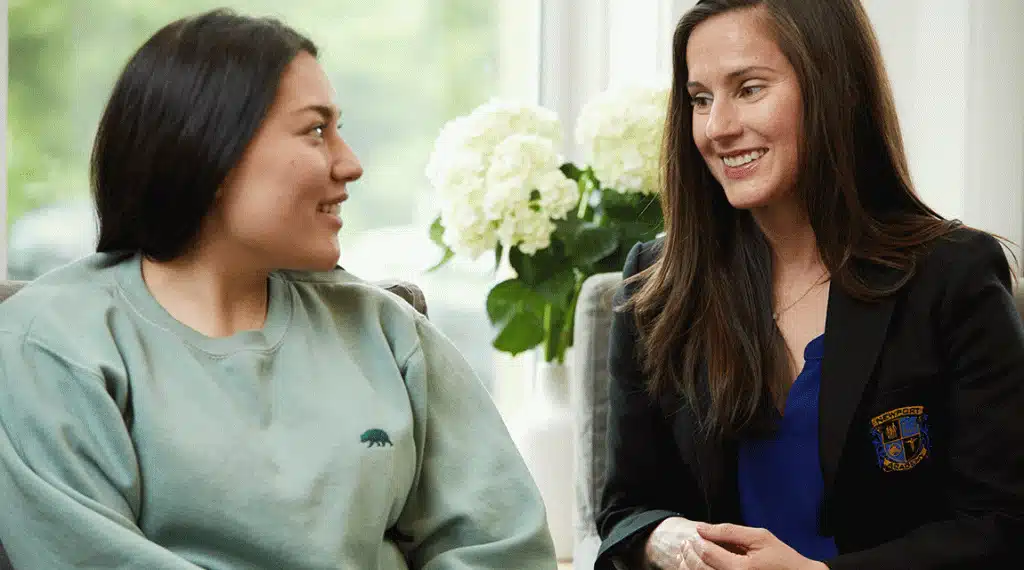The nation is facing a youth mental health crisis, and Virginia is no exception. The state faces devastating challenges in the arena of teen mental health. According to Mental Health America, 1 in every 5 teens in the state has experienced a major depressive episode. Yet teens in Virginia lack quality mental health treatment options. As a result, many Virginia parents don’t know where to turn for help.
Newport Academy is addressing this gap in care by providing evidence-based, outcomes-driven mental healthcare for teens. Our residential treatment centers in Virginia provide the highest-quality care for teen boys and girls ages 12–17.
The Lack of Teen Treatment Options in Virginia
Resources to address the teen mental health crisis in Virginia are sorely lacking. MHA’s 2023 statistics show that only one-third of youth with depression in Virginia receives consistent mental health services. Many young people need help, but their parents and guardians are unable to access mental health facilities in Virginia.
As a result, many teens end up in an ER or hospital, sometimes on immediate suicide watch in hospitals, due to the lack of access to mental health facilities in Virginia. Talking about this ongoing crisis, William Andrew Hazel Jr., the current Virginia Secretary of Health and Human Resources, “We have these problems all over healthcare … We have a system, in my mind, that is just set up to be ineffective.”
Virginia Mental Health Statistics 2023: Adolescents
Statistics from the Office of Adolescent Health at the US Department of Health and Human Services show that Virginia is faced with a flood of teenagers needing help, and lacks treatment options to provide those services.
The Virginia Department of Health’s Youth Survey reports the following Virginia mental health statistics:
- 32 percent of high school students in Virginia reported feeling sad or hopeless for two or more weeks in a row.
- Among that group, 39 percent reported having seriously considered attempting suicide.
- 3 in 10 students said they rarely or never get the help they need when they are in emotional distress.
- Nearly 40 percent of this group reported self-harming behavior.
The statistics above are compounded by the report of a 29 percent suicide rate increase among Virginia children and teens. As a result, legislators are considering how to expand the number of behavioral healthcare providers, while also facilitating enhanced prevention programs and education initiatives related to mental health.
NAMI Statement on Virginia Mental Health
The National Alliance on Mental Illness (NAMI) is a nationwide grassroots group that educates, supports, and advocates for people affected by mental illness and their families. Examining the challenge that has plagued Virginia since the start of the 21st century, the experts at NAMI state:
“Children and adolescents with mental health disorders deserve better access to services and treatment. There are several approaches for addressing Virginia’s shortcoming to serving this important population. The first is early detection and adequate services that can ameliorate the long-term effects of mental health disorders.”
Paired with early detection and assessment, treatment through weekly therapy, outpatient programming or residential programming is considered most effective. The best treatment centers for teens use a comprehensive, integrative approach that addresses the root causes of anxiety, depression, PTSD, and self-harm.

Warning Signs of Teen Depression
In Virginia, as in every US state, awareness and early assessment are key in addressing teen and young adult mental health. Parents and guardians need to understand the warning signs of teen depression, including the following symptoms:
- Avoidance of social situations and loss of interest in favored activities
- Exhaustion, constant fatigue, and generalized lack of energy
- Sense of despair, sadness, and hopelessness, sometimes escalating into suicidal thoughts
- Lack of motivation, resulting in feelings of guilt and/or failure
- Unexplained aches and pains, headaches, stomach problems
- Hard time concentrating (particularly for teens who used to be focused)
- Feeling worthless, irritable, frustrated, or having an extreme case of low self-esteem
- Disturbed sleep patterns (taking naps during the day, insomnia at night)
- Changes in appetite and weight, including not eating on a regular basis or binge eating
Newport Academy’s Teen Treatment Programs in Virginia
Newport Academy is addressing the lack of Virginia behavioral health services with our residential treatment centers for both male and female adolescents ages 12–17. We also have Virginia residential treatment centers for young adults: Find out more at NewportInstitute.com.
Our clinical model of care addresses the underlying causes of mental health and co-occurring disorders. Teens work with credentialed mental healthcare experts to heal the trauma and attachment wounds that catalyze anxiety, depression, and maladaptive behaviors like self-harm and eating disorders.
Research finds that longer-term care (at least 90 days of treatment) is necessary to make lasting positive change. Therefore, our treatment centers in Virginia provide strengths-based academic programming for teens, so they don’t fall behind in school while receiving the mental health treatment they need. At our residential treatment in Virginia, clients’ schedules include time in the classroom and studying life skills, in addition to individual, family, and group therapy sessions. Moreover, our campus is located in a beautiful natural setting, and therapeutic outdoor activities are an essential aspect of the treatment experience.

The Most Important Components of Mental Healthcare at Newport Academy
Each teen in our Virginia program has a tailored treatment plan, with clear goals and measurable outcomes, including a variety of evidence-based clinical and experiential modalities. Because every teen responds differently to different therapeutic approaches, it may take time to find the ones that are most effective for them. Our approach gives adolescents the opportunity to experience a wide range of modalities, including:
- Cognitive Behavioral Therapy
- Dialectical Behavioral Therapy
- Family therapy, using the Attachment-Based Family Therapy model designed to restore family connection so teens can turn to parents for support
- Group therapy that helps teens build community and overcome the feelings of isolation caused by anxiety and depression
- Experiential approaches such as fitness activities, art and music therapy, and Adventure Therapy activities like hiking, kayaking, and paddle boarding
- Mindfulness approaches like yoga and meditation
Building Authentic Connections with Family, Peers, and Therapists
Moreover, teens build caring and supportive relationships with peers and care providers, while healing the parent-child relationship. We recognize that involving the family in the treatment process is an essential part of achieving long-term, sustainable healing, and that authentic connections are at the heart of the healing journey.
Once our clients are ready to leave treatment, clinicians work with the family to create a comprehensive plan for continuing care after discharge. This typically includes a Partial Hospitalization Program, Intensive Outpatient Program, or another type of Virginia mental health services.
Learn More About Our Teen Treatment Centers in Virginia
Ultimately, we believe the goal of treatment is to support adolescents’ physical, mental, emotional, and spiritual well-being so they can move forward into a thriving future. To learn more about our Virginia residential treatment centers serving teen boys and girls, contact us today.
Sources:
Mental Health America
National Alliance on Mental Illness
Office of Adolescent Health, US Department of Health and Human Services






